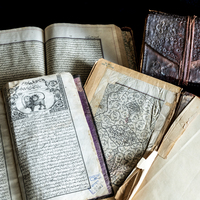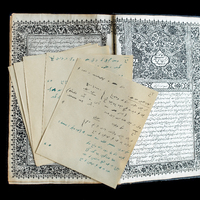Jan Rypka’s Legacy
Item
Title
en
Jan Rypka’s Legacy
cs
Odkaz Jana Rypky
Description
en
Jan Rypka played a pivotal role in the establishment of the Oriental Institute, where he was among the first 34 members appointed by President Masaryk in November 1927. His contributions to the institute extended beyond his scholarly work, encompassing his organizational efforts during its formative years. Notably, he was instrumental in the founding of Archiv Orientalni, the institute's publication.
Rypka's personal collection within the institute includes several significant and renowned works. Among them is a Persian historian's writings, authored by Muhammad ibn Khvandshah ibn Mahmud, more commonly known as Mirkhvand. Another noteworthy piece is a medical treatise by Mir Muhammad Mu'min Husaini Tonekaboni, also known as Hakim Mu'min, who served as a physician and pharmacist in the court of the Safavid Shah Sulayman. This treatise contains a handwritten dedication and numerous handwritten notes in Farsi in the margins. Additionally, Rypka's collection encompasses a 19th-century Persian dictionary created by a poet and literary historian. This dictionary includes inserted pieces of paper that likely bear Rypka's handwritten annotations. Lastly, the collection contains poetry by Qaani, one of the most renowned poets from the Qajar era. It's important to note that aside from these mentioned items, Rypka's collection consists of various other significant and valuable materials that enrich the cultural and academic resources of the Oriental Institute.
Rypka's personal collection within the institute includes several significant and renowned works. Among them is a Persian historian's writings, authored by Muhammad ibn Khvandshah ibn Mahmud, more commonly known as Mirkhvand. Another noteworthy piece is a medical treatise by Mir Muhammad Mu'min Husaini Tonekaboni, also known as Hakim Mu'min, who served as a physician and pharmacist in the court of the Safavid Shah Sulayman. This treatise contains a handwritten dedication and numerous handwritten notes in Farsi in the margins. Additionally, Rypka's collection encompasses a 19th-century Persian dictionary created by a poet and literary historian. This dictionary includes inserted pieces of paper that likely bear Rypka's handwritten annotations. Lastly, the collection contains poetry by Qaani, one of the most renowned poets from the Qajar era. It's important to note that aside from these mentioned items, Rypka's collection consists of various other significant and valuable materials that enrich the cultural and academic resources of the Oriental Institute.
cs
Dalším významným odkazem je sbírka vzácných rukopisů Jana Rypky, který sehrál klíčovou roli při založení Orientálního ústavu a byl jedním z prvních 34 členů, které v listopadu 1927 jmenoval prezident Masaryk. Kromě vědecké práce věnoval tedy i nemalé úsilí formování ústavu v začátcích jeho existence a stál u vzniku časopisu Archiv orientální.
Rypkova sbírka obsahuje několik významných a proslulých děl, například spis perského historika, Muhammad ibn Chvandsáh ibn Mahmúd, známějšího pod jménem Mirkhvand, či lékařské pojednání Mira Muhammada Mu'min Husainiho Tonekaboniho, známého také jako Hakim Mu'min, který působil jako lékař a lékárník na dvoře safíovského šáha Sulajmána. Tento traktát obsahuje ručně psané věnování a četné rukou psané poznámky v perštině na okrajích. Dále zde nalezneme perský slovník z 19. století, který vytvořil jistý básník a literární historik a který obsahuje vložené listy papíru pravděpodobně s Rypkovými vlastnoručními poznámkami, a také básně Qaaniho, jednoho z nejznámějších básníků z doby Kadžárovců. Je důležité poznamenat, že kromě těchto se Rypkova sbírka skládá z různých dalších významných a cenných materiálů, které obohacují kulturní a vědecké zdroje Orientálního ústavu.
Rypkova sbírka obsahuje několik významných a proslulých děl, například spis perského historika, Muhammad ibn Chvandsáh ibn Mahmúd, známějšího pod jménem Mirkhvand, či lékařské pojednání Mira Muhammada Mu'min Husainiho Tonekaboniho, známého také jako Hakim Mu'min, který působil jako lékař a lékárník na dvoře safíovského šáha Sulajmána. Tento traktát obsahuje ručně psané věnování a četné rukou psané poznámky v perštině na okrajích. Dále zde nalezneme perský slovník z 19. století, který vytvořil jistý básník a literární historik a který obsahuje vložené listy papíru pravděpodobně s Rypkovými vlastnoručními poznámkami, a také básně Qaaniho, jednoho z nejznámějších básníků z doby Kadžárovců. Je důležité poznamenat, že kromě těchto se Rypkova sbírka skládá z různých dalších významných a cenných materiálů, které obohacují kulturní a vědecké zdroje Orientálního ústavu.

